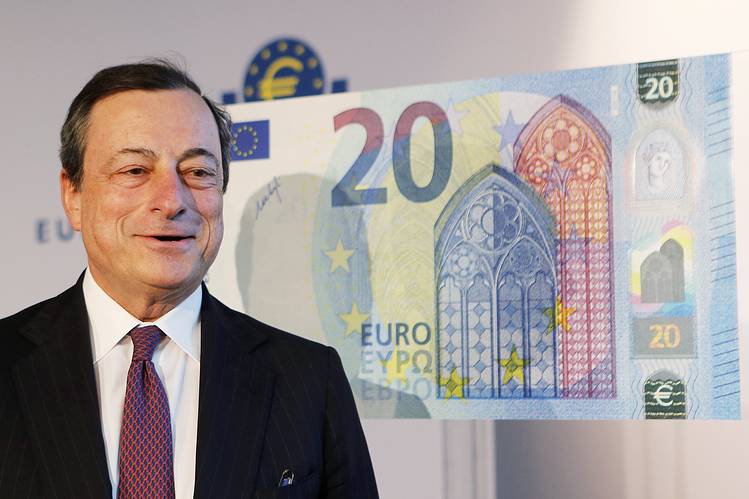The European Central Bank will start buying corporate bonds next week as officials’ stimulus program announced in March broadens to a new asset class in their struggle against deflation.
The Governing Council, meeting in Vienna, left the main refinancing rate at zero, the deposit rate at minus 0.4 percent. As a component of its asset purchases of 80 billion euros ($89 billion) a month, the ECB will begin buying corporate bonds on June 8, according to a statement. President Mario Draghi will hold a press conference at 2:30 p.m. local time, when he’ll also release updated economic projections for the euro area.
Two months after announcing fresh stimulus measures, policy makers are putting them into action while at the same time warning that all monetary policy can do is to buy time. Officials have been increasingly vocal in their criticism of governments for failing to use fiscal room or implement the structural reforms that are critical to lifting the currency bloc’s growth potential.
“We had all the big policy announcements couple of months ago and now is the time for implementation,” Sarah Hewin, chief European economist at Standard Chartered Bank in London, said on Bloomberg Television. “Draghi will reiterate that governments need to do more. We know that the European Central Bank, the Governing Council feel it most strongly that they’ve done all the heavily lifting so far and governments need to take action.”
The ECB’s new economic forecasts may highlight the central bank’s struggle to return inflation to its price-stability goal of just under 2 percent. The rate was at minus 0.1 percent in May.
One euro-area official, who spoke on condition of anonymity because the forecasting process is private, said that the inflation and economic-growth outlook will probably be upgraded mildly for this year and then stay unchanged over the rest of the horizon.
Such an outcome would leave the estimate for average inflation in 2018 at 1.6 percent. An ECB spokesman declined to comment on the projections.
While that would at least be the first time in a year the central bank has been able to avoid downgrading its outlook, a failure to lift the forecasts significantly would still be worrisome. The previous projections in March didn’t incorporate the effect of an enlarged stimulus program, and Vice President Vitor Constancio said only last week that he personally believed consumer-price growth in two years would exceed estimates.
More to Come
Policy makers still have stimulus to come. Corporate-bond purchases are scheduled to start next Wednesday and a new program of long-term loans to banks will begin on June 22, the ECB said on Thursday. It will release further details of the loan measures after Draghi’s press conference.
Most economists surveyed by Bloomberg said the ECB will probably announce new measures before the end of the year, most likely extending QE past the current end-date of March 2017.
Still, Draghi said at his previous press conference in April that the Governing Council was putting a “renewed emphasis” on the need for structural reforms. He may well reiterate that when he briefs reporters. He’ll also speak at 4:15 p.m. at an event to mark the 200th anniversary of the Austrian central bank.

 Forex3 weeks ago
Forex3 weeks ago


 Naira2 weeks ago
Naira2 weeks ago
 Billionaire Watch2 weeks ago
Billionaire Watch2 weeks ago




 Naira2 weeks ago
Naira2 weeks ago




 Naira2 weeks ago
Naira2 weeks ago




 Naira1 week ago
Naira1 week ago




 Naira4 weeks ago
Naira4 weeks ago




 Naira3 weeks ago
Naira3 weeks ago


















